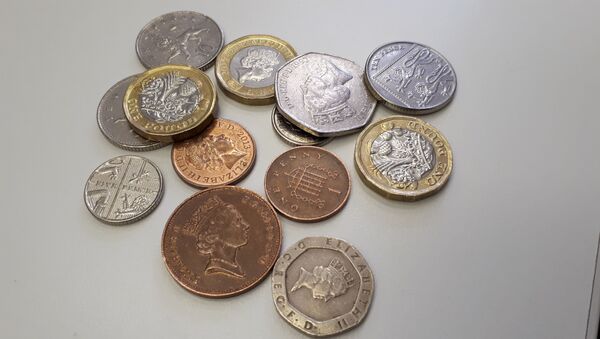The possible scrapping of the copper coins — which have been in existence since Britain switched to decimal currency in 1971 — is part of a much wider re-examination of the future of cash, which includes consideration of the role of bitcoin in the UK economy.
"We will call for evidence on how to encourage cashless and digital payments, while ensuring cash remains available to those who need it," said the Chancellor in his Spring Statement on Tuesday, March 13.
Beth Fox, 21, who lives in London, said she would miss the one pence and two pence coins if they were to be scrapped.
If, as suggested in one spring statement document, the Treasury does away with 1p and 2pm coins, what happens to those 2p cascade machines? Could badly affect the seaside resort industry, not to mention the fun of lots of kids.
— Peter Walker (@peterwalker99) 13 March 2018
'I Like Having Change'
"I don't want to scrap them. I like change in my pocket," Miss Fox told Sputnik.
Downing St says it will listen to the public on pennies and the reaction so far suggests they will be safe —but consultation goes on till June 5
— steve hawkes (@steve_hawkes) 14 March 2018
But Louise Somers, 24, who moved from Britain to Canada last year, had a very different outlook.
"I don't miss them one bit here. They only have five cents so servers just round it up to the closest 5 or 10 and it means your pockets are way lighter and far easier to work out quick maths," Miss Somers told Sputnik.
I've never used 1p or 2p coins in my entire life, why do they even exist lol.
— no 🅥🗑️ (@Podel_irl) 13 March 2018
If the 1p and 2p coin are consigned to history they will follow the halfpenny coin, which was scrapped in 1984.
Banks are to send unused stocks back to the Royal Mint to be melted down.
1p Coins May Cost More to Produce Than They Are Worth
The halfpenny coin's fate was sealed when it became more expensive to make than its face value and it is thought that may be the case with 1p and 2p coins, both of which are made from copper-plated steel.
The price of copper has risen to $7,000 per kilogram — up from $4,000 in 2016 — on the international market.
But a Treasury spokeswoman said it was a "commercially sensitive" subject and she could not give details on how much it cost to manufacture the 1p or 2p coin.
Campaign to retain the 1p coin starts now. To abolish penny would be to give into inflation and to trash 1000 years of history. #soundmoney
— Nick Macpherson (@nickmacpherson2) 13 March 2018
Last year a bill was introduced in the US Congress which would have abolished the one cent coin.
In the document the Treasury published on Tuesday there were some fascinating nuggets of information about how cash has fallen out of fashion in 21st century Britain, especially with the younger generation, so-called "millennials".
Millennials Have Stopped Using Cash
The Treasury said surveys showed 11 percent of those aged 25-34 said they "rarely used cash" at all, compared with only two percent of those aged 55-64.
The document also revealed six out of ten 1p and 2p coins were used in only one transaction before leaving the cash cycle.
"They are either saved, or in eight percent of cases are thrown away," says the Treasury report.
Because so many copper coins vanish out of circulation the Royal Mint has been forced to produce and issue more than 500 million 1p and 2p coins every year to replace those which have been thrown away or ended up in piggy banks.
Unbelievable. Government is looking at scrapping 1p and 2p coins because "six in ten 1p and 2p coins" are leaving "the cash cycle"; 8 per cent are thrown away. #SpringStatement
— Christopher Hope 📝 (@christopherhope) 13 March 2018
"Technology has revolutionized the way people shop, sell, and save, and people are increasingly moving away from using cash. Cash has fallen from being 62 percent of all payments by volume in 2006, to 40 percent in 2016, and is predicted by industry to fall to 21 percent by 2026.
"Contactless payments made each month have grown by nearly 20 times in the three years to June 2017…Digital payments can offer consumers and businesses convenient, tailored, and flexible ways of making purchases. Increasingly, they can also offer additional services, such as ways to help budget, or keep a record of transactions," said the report.
2.7 Million People Still Rely on Cash
But the Treasury insists cash has not become "obsolete" and they said 2.7 million people in Britain are entirely reliant on cash.
In the UK most retailers invariably advertise products for 99p or £9.99 in an attempt to make them sound cheaper.
Nick Ferrari leads the campaign against the government's plan to phase out 1p and 2p coins. pic.twitter.com/OCO99m8GAe
— LBC (@LBC) 14 March 2018
Soon this option will not exist.
In 2001 entrepreneur Nadir Lalani set up a chain of shops, known as 99p Stores, across Britain but in February 2015 he sold them to rival Poundland for £55 million.
Most of the 99p Stores shops were rebranded as Poundland but last year it announced the remaining 60 stores would be closed.




